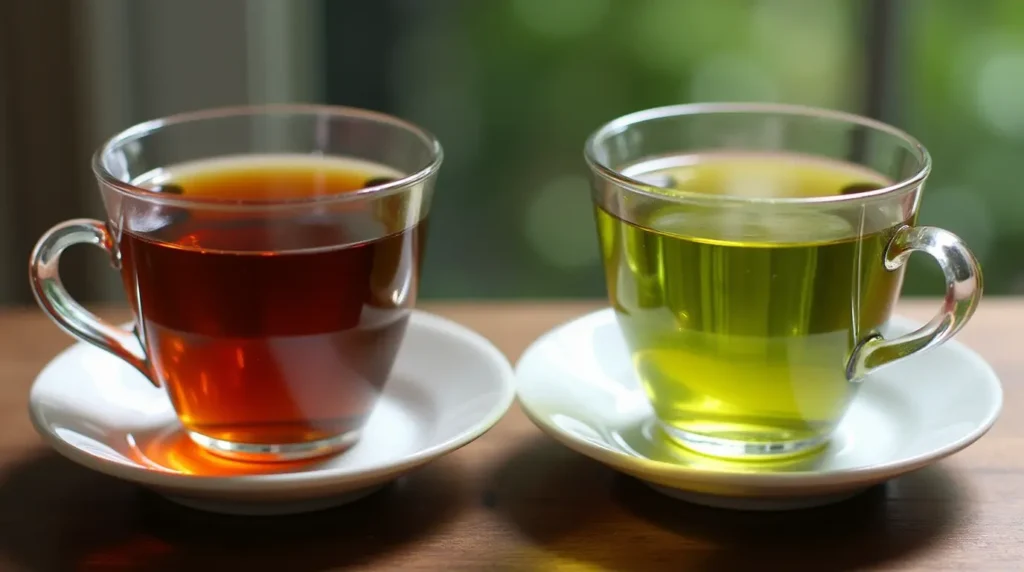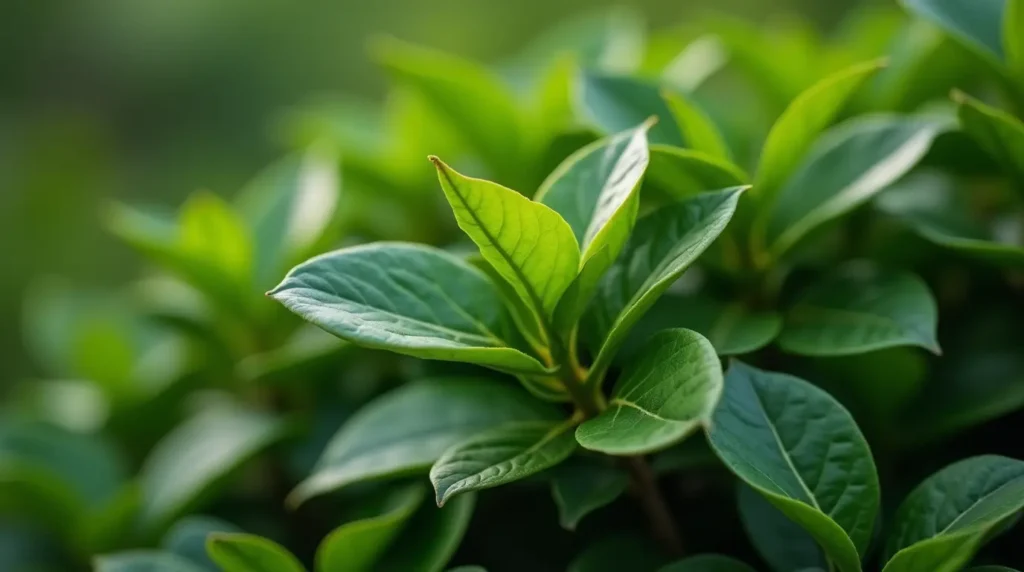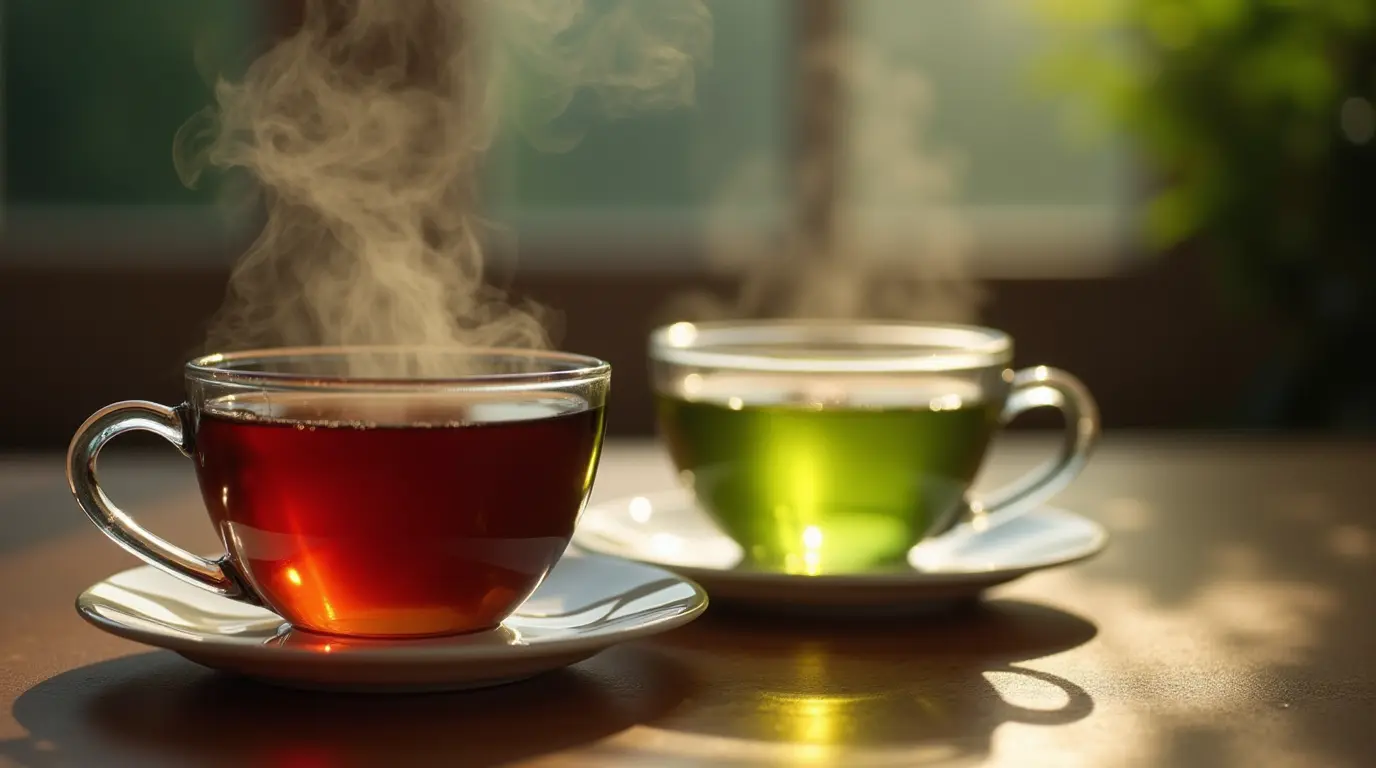Table of Contents
Tea is a favorite drink around the world, with many types to choose from. Black tea vs green tea are two popular ones. They both come from the Camellia sinensis plant. But, how they’re made changes their taste, health benefits, and what’s in them.
This article will look at where black tea vs green tea come from, how they’re made, and what’s good for you. We’ll explore what makes each tea special. This will help you understand how they can be part of a healthy life.
Key Takeaways
- Black tea vs green tea are both derived from the same plant, Camellia sinensis, but undergo different processing methods.
- The oxidation process is a key difference, with black tea being fully oxidized and green tea being minimally oxidized.
- Black tea vs green tea have distinct chemical compositions, leading to differences in their caffeine content, antioxidant profiles, and health benefits.
- Green tea is generally associated with higher antioxidant levels and potential benefits for weight management and cardiovascular health.
- Black tea may provide a stronger caffeine boost and potential benefits for mental focus and alertness.
The Origins and Processing Methods of Black and Green Tea

The world of tea is filled with history and tradition. Black and green tea have their own origins and ways of being made. This gives them their unique tastes and smells.
Traditional Chinese and Japanese Processing Techniques
Black and green tea come from ancient Chinese and Japanese tea traditions. In China, black tea is made by withering, rolling, oxidizing, and drying. This makes it strong and full of flavor.
In Japan, green tea is known for its light, grassy taste. This is because the leaves are steamed. This stops the oxidation and keeps the tea’s natural color and nutrients.
Oxidation and Its Impact on Tea Properties
The oxidation process is a key factor that separates black tea from green tea. Oxidation changes the tea leaves’ flavor, aroma, and color. Black tea gets a lot of oxidation, making it taste deeper and more complex.
Green tea, on the other hand, gets very little oxidation. This keeps its fresh, vibrant taste.
Modern Manufacturing Methods
In today’s world, tea making has changed a lot. New methods have been added to make tea production more efficient and consistent. Machines now help with steps like withering, rolling, drying, and packaging.
These changes have made tea more available worldwide. Yet, they still keep the traditional methods alive.
| Processing Step | Black Tea | Green Tea |
| Withering | Leaves are left to wilt and lose moisture | Leaves are not wilted, retaining moisture |
| Oxidation | Extensive oxidation, resulting in a robust flavor | Minimal oxidation, preserving the fresh, vibrant taste |
| Drying | Leaves are dried to reduce moisture content | Leaves are quickly dried to prevent oxidation |
Chemical Composition and Nutrient Profile
When we talk about black tea vs green tea benefits, it’s all about their chemical makeup. Both black and green tea come from the same plant, Camellia sinensis. But, how they’re processed changes their health benefits.
Green tea is packed with catechins, powerful antioxidants. Black tea, on the other hand, has more theaflavins and thearubigins. These are different antioxidants formed during black tea’s oxidation process.
| Compound | Black Tea | Green Tea |
| Catechins | Lower | Higher |
| Theaflavins and Thearubigins | Higher | Lower |
| Caffeine | Higher | Lower |
| Fluoride | Higher | Lower |
Black tea also has more caffeine and fluoride than green tea. These differences affect their health benefits.
- Black tea’s theaflavins and thearubigins might offer special antioxidant and anti-inflammatory effects.
- Green tea’s catechins are linked to better heart health, brain function, and weight management.
- Black tea’s caffeine gives a stronger boost, while green tea’s is milder.
The black tea vs green tea benefits debate shows their unique health benefits. Knowing these differences helps us choose the right tea for our health and taste preferences.
Caffeine Content Comparison: Black Tea vs Green Tea
Black tea vs green tea have different amounts of caffeine. Knowing this can help you choose the right tea for your energy needs. It affects how alert you feel and how well you sleep.
Effects on Energy Levels and Focus
Black tea has more caffeine than green tea. An 8-ounce cup of black tea has about 47 milligrams of caffeine. Green tea has around 28 milligrams. This means black tea can give you a bigger energy boost and help you focus better.
Best Times for Consumption
- Black tea: It’s best to drink black tea in the morning or early afternoon. This avoids messing up your sleep.
- Green tea: You can drink green tea all day. It won’t hurt your sleep as much as black tea might.
Impact on Sleep Patterns
Black tea’s caffeine can affect your sleep more than green tea’s. Drinking black tea too close to bedtime can make it hard to fall asleep. Green tea, with less caffeine, is gentler on your sleep. It helps you sleep better.
| Characteristic | Black Tea | Green Tea |
| Caffeine Content (per 8 oz cup) | 47 mg | 28 mg |
| Energy and Focus | Higher boost | Moderate boost |
| Best Consumption Time | Morning or early afternoon | Throughout the day |
| Impact on Sleep | May disrupt sleep quality | Minimal impact on sleep |
Antioxidant Properties and Health Benefits

The debate between black tea vs green tea often focuses on their antioxidants and health benefits. Both teas have many antioxidants, but the types and amounts differ.
Green tea is famous for its high levels of catechins, especially EGCG. These antioxidants may help protect against diseases like cancer and heart disease.
Black tea has its own set of antioxidants, including theaflavins and thearubigins. These compounds also show strong antioxidant properties, contributing to black tea’s health benefits.
Potential Health Benefits
- Immune system support: Both black and green tea’s antioxidants boost the body’s defenses, supporting immune function.
- Disease prevention: Drinking black or green tea regularly may lower the risk of cancer, heart disease, and neurodegenerative disorders.
- Cognitive function: Tea’s antioxidants may improve memory, focus, and brain health.
- Healthy aging: Tea’s antioxidants may slow aging and promote well-being.
Research on black tea vs. green tea is ongoing, but both are rich in antioxidants. Whether you like black tea’s robust flavor or green tea’s grassy taste, adding them to your daily routine can boost your health.
Weight Loss and Metabolism Effects
Black tea vs green tea both have special properties that can help with weight loss and metabolism. Research shows that both teas might have benefits for weight management. But, the exact relationship between tea and weight loss is still being studied.
Metabolic Rate Enhancement
Antioxidants and caffeine in black and green tea may boost your metabolic rate. The caffeine in these teas can start thermogenesis, a process that burns calories and fat. This could help your metabolism work a bit harder, aiding in weight loss.
Fat Burning Properties
Black and green tea contain compounds like catechins and polyphenols. These can help break down fat cells. These compounds might help use stored fat as energy, leading to less body fat. But, how much effect this has can depend on many factors, like your diet.
Dietary Considerations
- Drink black or green tea as part of a balanced, low-calorie diet for better weight management.
- Don’t add lots of sugar or cream to your tea, as it can cancel out any weight loss benefits.
- Drink tea with regular exercise and enough water for a complete health plan.
Black tea vs green tea might help a bit with metabolism and fat burning. But, their effect on weight loss is likely small. Eating healthy and exercising regularly are key for lasting weight loss. Adding these teas to your lifestyle can help support your weight loss goals.
Impact on Heart Health and Blood Pressure
Black tea vs green tea both have benefits for heart health and blood pressure. Research shows they can help the heart in different ways.
Black tea is good for blood pressure regulation. It has flavonoids that help dilate blood vessels and improve endothelial function. This is key for keeping blood pressure healthy. Drinking black tea can also lower the risk of heart disease and stroke.
Green tea is known for its cholesterol-lowering properties. It has catechins that inhibit the absorption of cholesterol and promote the excretion of LDL (bad) cholesterol. This helps improve heart health and lower the risk of heart attacks and strokes.
- Black tea can help regulate blood pressure and reduce the risk of heart disease and stroke.
- Green tea can lower cholesterol levels and promote overall cardiovascular health.
Both black tea vs green tea are great for heart health and blood pressure. Adding them to your diet can help keep your heart healthy.
Mental Health Benefits and Cognitive Function
Black tea vs green tea have their own special benefits for mental health and brain function. They are known for reducing stress and improving memory. This makes them great choices for anyone looking to stay healthy.
Stress Reduction Properties
Many studies show that black tea vs green tea can ease stress and help you relax. They contain special compounds like L-theanine and polyphenols. These help calm your mind, lower stress hormones, and reduce stress symptoms.
Memory Enhancement Effects
These teas also boost brain function and memory. They have catechins and flavonoids that help grow brain cells and improve memory. This is good for learning and remembering things.
The caffeine in both teas can also help with focus and speed. It’s great for work or school. But, remember that everyone reacts differently to caffeine, so watch how it affects you.
In summary, black tea vs green tea are excellent for your mental health and brain power. They offer many benefits that can improve your overall well-being and mental sharpness.
Taste Profiles and Brewing Methods
Black and green tea have different taste profiles because of how they’re made. Black tea is strong and full-bodied, with flavors of malt and caramel. It’s often described as bold and brisk. Green tea, on the other hand, is light and has a vegetal aroma. It tastes grassy, herbaceous, or slightly sweet.
The way you brew black and green tea is also different. Black tea needs hot water (around 200°F/93°C) and a longer steeping time of 3-5 minutes. This brings out its complex flavors. Green tea, however, is best with cooler water (around 170°F/77°C) and a shorter steeping time of 1-2 minutes. This helps keep its delicate taste and prevents bitterness.
Whether you like the rich taste of black tea or the light elegance of green tea, knowing how to brew each can enhance your experience. It lets you enjoy the full flavor in every sip.
FAQ
What are the key differences between black tea vs green tea?
Black tea is made by letting it oxidize, which makes it darker and more full-bodied. Green tea, however, is steamed or pan-fired to keep its fresh taste.
Which tea has more health benefits, black tea or green tea?
Both teas are good for you, but in different ways. Green tea has more antioxidants and compounds like catechins, which help your heart and might help with weight. Black tea, with its theaflavins and thearubigins, also has strong antioxidants.
How do the caffeine levels in black tea vs green tea compare?
Black tea usually has a bit more caffeine than green tea. But, the amount can change based on the tea type, how it’s made, and how you brew it. Both teas can give you a boost, but green tea might be better for those who are caffeine-sensitive.
Which tea is better for weight loss, black tea or green tea?
Both teas might help with weight loss and boost your metabolism. Green tea is known for its catechins, which could help burn fat. But, how well either tea works for weight loss also depends on your diet and lifestyle.
How do the taste profiles of black tea vs green tea differ?
Black tea tastes stronger, with hints of malt, caramel, or smokiness. Green tea is fresher, with grassy and sometimes vegetal notes, and can have floral or nutty hints. The flavor difference comes from black tea’s oxidation process.

